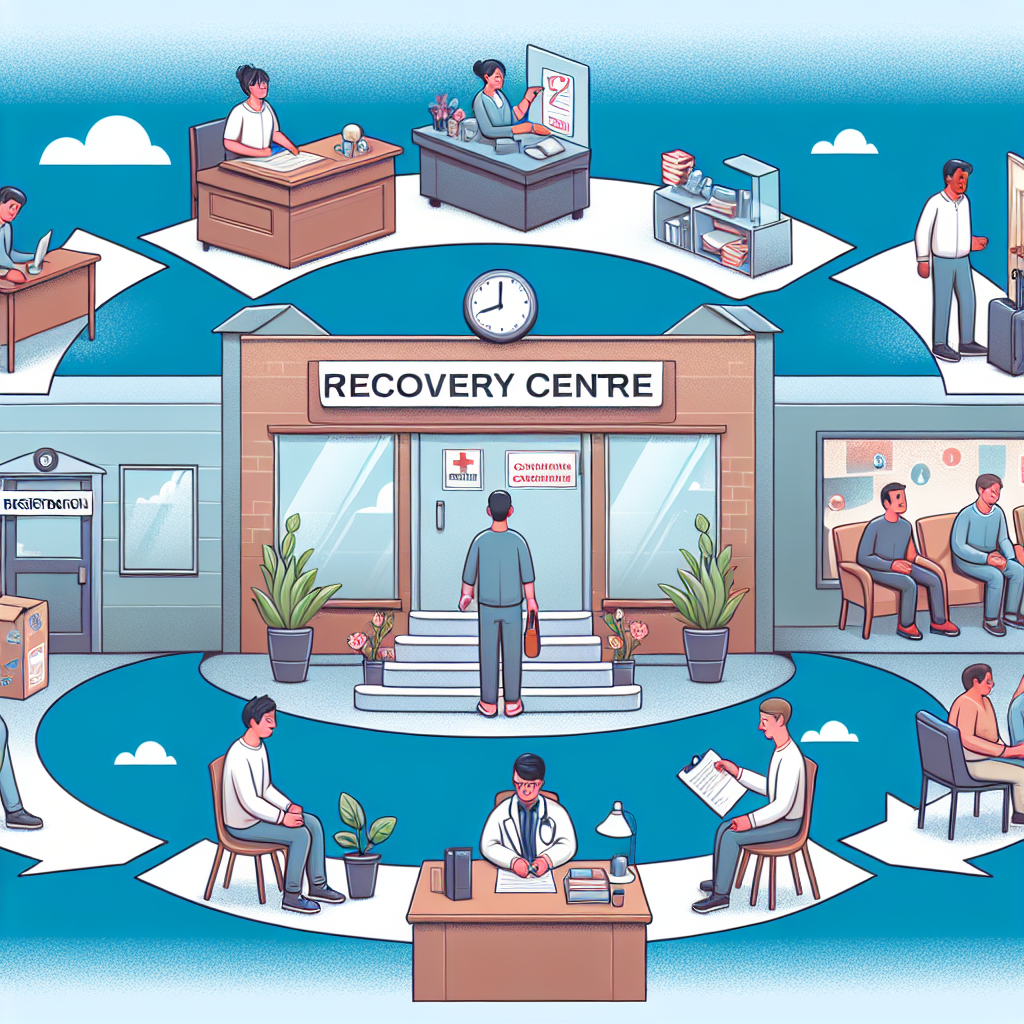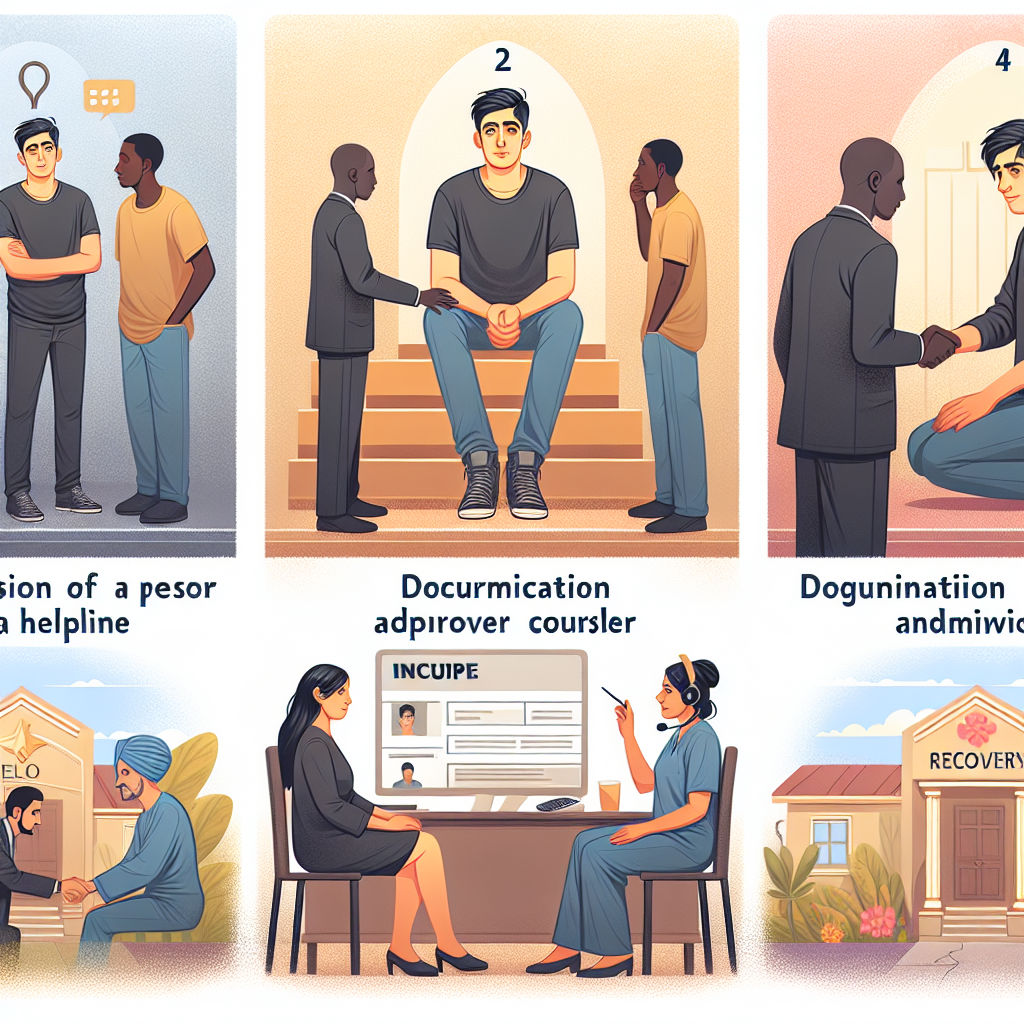-
Table of Contents

“Guiding You Step-by-Step: Your Path to Recovery Begins Here”
Introduction
The intake process for addiction recovery services is a critical initial step designed to assess and understand the unique needs of individuals seeking help for substance use disorders. This process typically involves a comprehensive evaluation conducted by healthcare professionals, which includes gathering detailed information about the individual’s medical history, substance use patterns, mental health status, and social circumstances. The goal is to develop a personalized treatment plan that addresses the specific challenges and goals of the individual. The intake process may also involve screenings for co-occurring mental health conditions, discussions about treatment options, and the establishment of a support network to aid in the recovery journey. This thorough assessment ensures that the treatment provided is tailored to the individual’s needs, thereby enhancing the likelihood of successful recovery.
Understanding The Initial Assessment In The Addiction Recovery Intake Process
The intake process for addiction recovery services is a crucial first step on the path to sobriety and healing. Understanding the initial assessment in this process can help demystify what can often seem like a daunting journey. This initial phase is designed to gather comprehensive information about the individual seeking help, ensuring that the treatment plan is tailored to their specific needs and circumstances. By approaching this step with openness and honesty, individuals can set a strong foundation for their recovery journey.
The intake process typically begins with a phone call or an online inquiry, where the individual or their loved ones reach out to a treatment center. During this initial contact, basic information is collected, and an appointment for a more detailed assessment is scheduled. This first interaction is often reassuring, as it provides a sense of direction and immediate support. It is important to remember that the professionals on the other end are there to help, not judge, and their primary goal is to facilitate the best possible care.
When the individual arrives for their assessment, they are usually greeted by a compassionate intake coordinator or counselor. This person plays a pivotal role in making the individual feel comfortable and understood. The assessment itself is comprehensive, covering various aspects of the individual’s life, including their medical history, substance use patterns, mental health status, and social environment. This holistic approach ensures that all factors contributing to the addiction are identified and addressed.
During the assessment, the individual may be asked to complete several standardized questionnaires and participate in a face-to-face interview. These tools help the treatment team gain a deeper understanding of the individual’s unique situation. Questions may delve into the frequency and quantity of substance use, any previous attempts at sobriety, and the presence of co-occurring mental health disorders such as depression or anxiety. Additionally, the assessment will explore the individual’s support system, including family dynamics and social connections, which are critical components of the recovery process.
One of the most important aspects of the initial assessment is the development of a personalized treatment plan. Based on the information gathered, the treatment team will recommend a course of action that may include detoxification, inpatient or outpatient treatment, therapy, and support groups. This plan is not set in stone; it is a dynamic roadmap that can be adjusted as the individual progresses through their recovery journey. The goal is to provide a structured yet flexible framework that addresses the individual’s needs at every stage of their recovery.
Throughout the intake process, it is essential for the individual to maintain open communication with the treatment team. Honesty about their struggles, fears, and hopes can significantly enhance the effectiveness of the treatment plan. It is also important for the individual to ask questions and seek clarification about any aspect of the process they do not understand. This proactive approach fosters a collaborative relationship between the individual and their treatment providers, which is vital for successful recovery.
In conclusion, the intake process for addiction recovery services is a foundational step that sets the stage for a personalized and effective treatment journey. By understanding the initial assessment and approaching it with openness and honesty, individuals can embark on their path to recovery with confidence and hope. The compassionate support of the intake team, combined with a comprehensive and tailored treatment plan, provides the necessary tools for individuals to overcome addiction and reclaim their lives.
Key Steps In The Intake Process For Addiction Recovery Services
The intake process for addiction recovery services is a crucial first step on the path to sobriety and a healthier life. It is designed to ensure that individuals receive the most appropriate and effective treatment tailored to their unique needs. Understanding the key steps in this process can help demystify it and inspire those seeking help to take that vital first step.
Initially, the intake process begins with a comprehensive assessment. This assessment is typically conducted by a trained addiction specialist or counselor who will gather detailed information about the individual’s substance use history, mental health status, medical history, and social circumstances. This step is essential because it provides a holistic view of the individual’s situation, allowing the treatment team to develop a personalized recovery plan. During this phase, it is important for individuals to be as honest and open as possible, as this information will directly influence the type and level of care they receive.
Following the assessment, the next step involves determining the appropriate level of care. Addiction recovery services can range from outpatient programs, where individuals attend therapy sessions while continuing to live at home, to inpatient or residential treatment programs, which provide a more intensive, structured environment. The decision on the level of care is based on the severity of the addiction, the presence of co-occurring mental health disorders, and the individual’s support system. This tailored approach ensures that each person receives the care that best suits their needs, increasing the likelihood of successful recovery.
Once the level of care is determined, the individual will undergo a medical evaluation. This evaluation is conducted by healthcare professionals to identify any physical health issues that need to be addressed during treatment. It may include blood tests, physical examinations, and screenings for infectious diseases. Addressing medical concerns is a critical component of the intake process, as untreated health issues can hinder the recovery process and overall well-being.
After the medical evaluation, the individual will meet with a treatment team to develop a personalized treatment plan. This plan outlines the specific therapies and interventions that will be used during the recovery process. It may include individual counseling, group therapy, family therapy, medication-assisted treatment, and holistic approaches such as yoga or meditation. The treatment plan is a dynamic document that can be adjusted as the individual progresses through their recovery journey.
In addition to developing a treatment plan, the intake process also involves setting goals and establishing a support network. Setting realistic, achievable goals helps individuals stay motivated and focused on their recovery. These goals can be related to various aspects of life, including physical health, emotional well-being, relationships, and career aspirations. Establishing a support network is equally important, as having a strong support system can provide encouragement, accountability, and a sense of community.
Finally, the intake process includes an orientation to the treatment program. This orientation helps individuals understand what to expect during their recovery journey, including the rules and guidelines of the program, the daily schedule, and the available resources. It also provides an opportunity for individuals to ask questions and address any concerns they may have.
In conclusion, the intake process for addiction recovery services is a comprehensive and personalized approach designed to set individuals on the path to successful recovery. By understanding and participating fully in each step of this process, individuals can feel empowered and inspired to take control of their lives and achieve lasting sobriety.
Q&A
1. **Question:** What initial assessments are typically conducted during the intake process for addiction recovery services?
**Answer:** Initial assessments during the intake process for addiction recovery services typically include a comprehensive evaluation of the individual’s medical history, substance use history, mental health status, and social circumstances to determine the appropriate level of care and treatment plan.
2. **Question:** What documentation is usually required during the intake process for addiction recovery services?
**Answer:** Documentation required during the intake process for addiction recovery services usually includes identification, insurance information, consent forms, medical records, and any previous treatment records.
Conclusion
The intake process for addiction recovery services typically involves several key steps: initial contact and screening, comprehensive assessment, development of a personalized treatment plan, and orientation to the program. During initial contact, individuals provide basic information and undergo a preliminary screening to determine the appropriateness of services. A comprehensive assessment follows, involving detailed evaluations of medical, psychological, and social factors. Based on the assessment, a personalized treatment plan is created, outlining specific goals and interventions. Finally, the individual is oriented to the program, including an introduction to the facility, staff, and rules. This structured process ensures that each person receives tailored and effective care.



